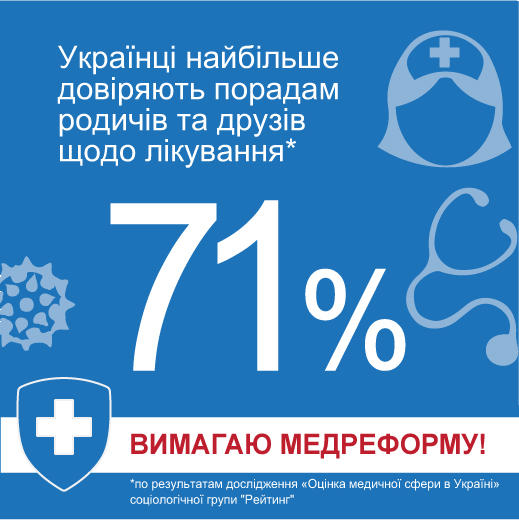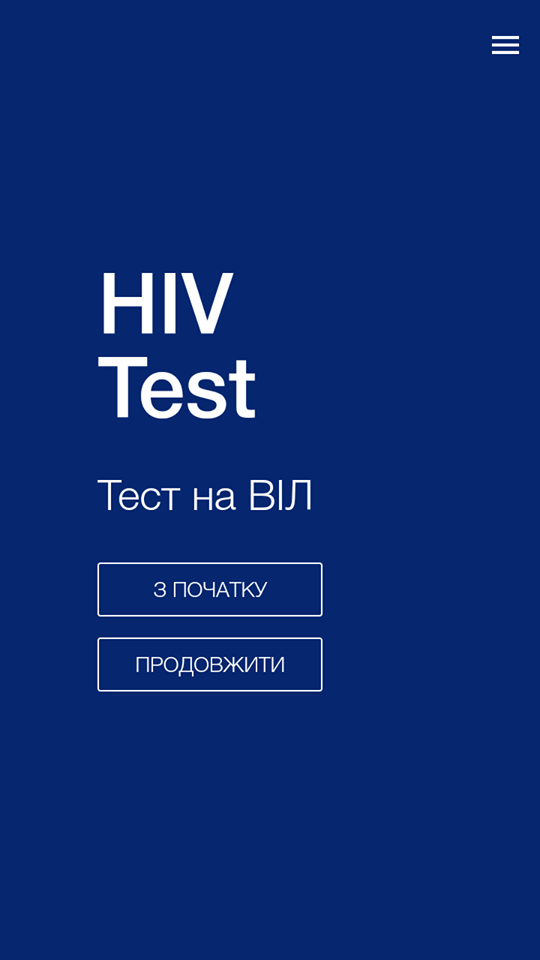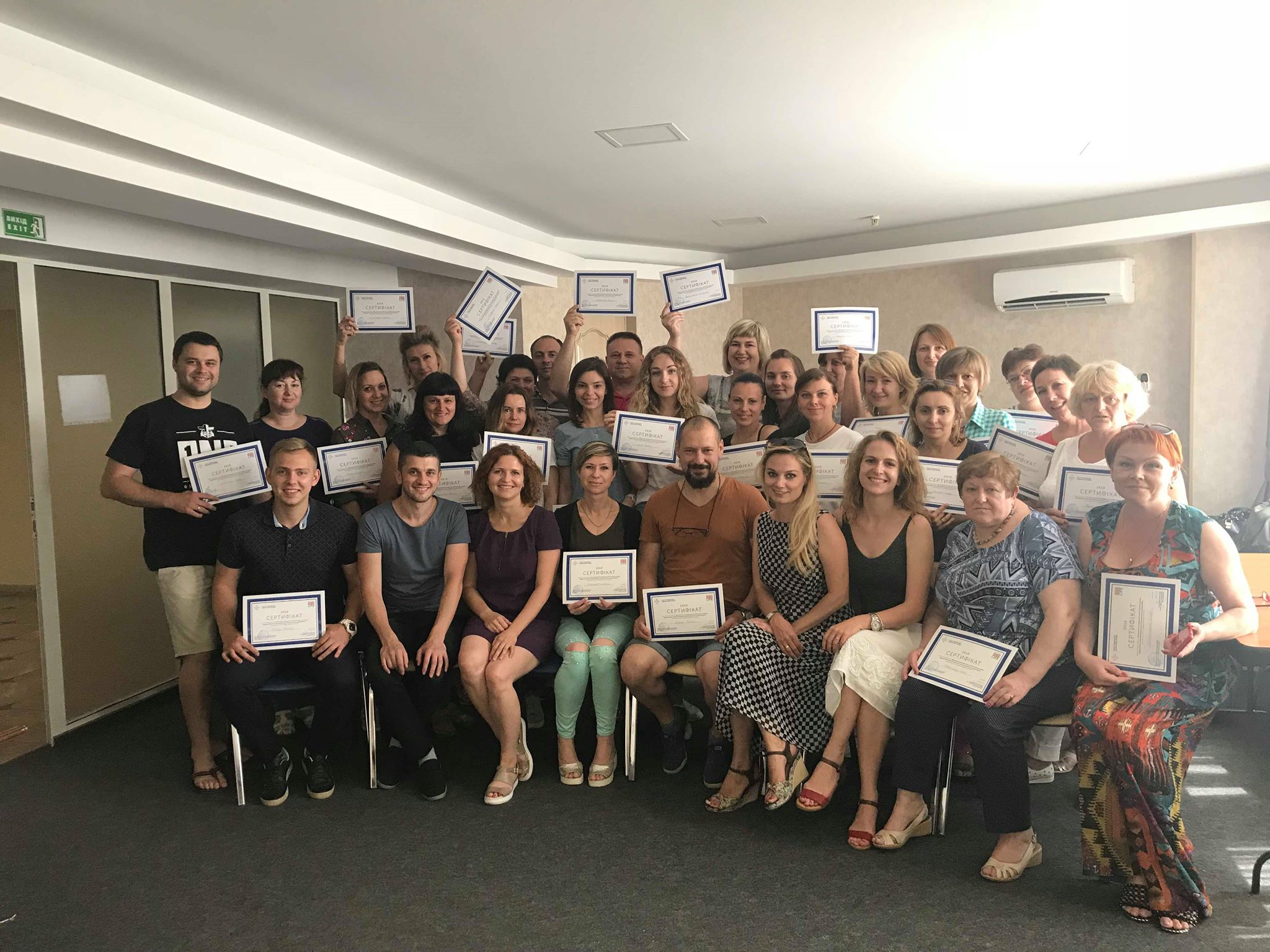
• According to the research carried out by the Sociological Group “Rating” in July-August 2017, 47% of the respondents stated that over the past two years, the overall quality of the public health services in the country has worsened. Only 10% saw an improvement. One-third (34%) believes that the quality level of the public health services has not changed, 9% – were not able to answer.
• In terms of the advice on the treatment or healthy lifestyle, the vast majority of the polled (71%) trusts the most in those advice given by the relatives and friends. Respondents are showing almost the same high level of confidence in the treatment advice of the medical staff: thus, the most trusted are ambulance physicians – 68% of the polled, qualified nurses – 66%, pharmacists – 65%, family doctors and physicians – the least trusted of all the medical staff – 63%. Interestingly, the half of the respondents (51%) trusts the advice of the teachers of medical specialties, almost the same number (46%) – the advice of the athletes. One-third of the respondents (31%) trust the advice of the priests and church ministers, while 15% listen to the traditional healers and psychics. Only 4% indicated that they trust treatment or healthy lifestyle advice of the people’s deputies.
• Relatives and friends are the most trusted in the South, as well as among older people and those with relatively low income. Advice of the medical workers are the most trusted in the East, among older people, mostly women, and those with average or high incomes. Teachers of medical specialties and athletes are more likely to be trusted by young people and middle-aged people, mainly men, and also persons with relatively high income. Traditionally, the advice of the priests are more appreciated in the West, by older generation, and mostly women. Information received from the traditional healers is more likely to be trusted in the East, by middle-aged and older people, more women than men.
• Almost a half of the polled (46%) do not trust in homeopathy as a health care system. At the same time, almost one-third (30%) of the respondents still show confidence in this alternative medical system – the number of such is higher in the East, among women and older people. A quarter (24%) was not able to answer.
• 57% know their family doctor or physician. The greatest awareness is observed in the East, among urban citizens, women, and older people.
• The vast majority of the polled (93%) do not possess private health insurance; thus, only 7% do have such insurance. It should be noted that even among the respondents with more or less high income (more than 5 thousand UAH), there was recorded only 11% of those who do have health insurance. Moreover, more than a half of the respondents state that even in case they had medical insurance, they would visit doctors as usual; one-third – would do it more often, 6% – on the contrary, less often.
• The number of those who argue that the treatment for them and their family is very expensive has grown significantly: from 39% in October last year to 61%. Such anxiety is expressed more in the Center and South, by older people, and those with low income and lack of private insurance. Only 13% of the respondents noted that the treatment is more or less affordable for them. Even a half of those who do have medical insurance state that the treatment is very expensive for them.
• Among the government initiatives in the medical sphere, the respondents are the most aware of the introduction of a free-of-charge delivery of medicines for diabetes, asthma, and cardiovascular diseases by doctor’s prescription (77%) and the introduction of the nationwide health insurance (61%). A half of the respondents are aware of such initiatives as increasing the doctors’ salaries through the introduction of a contract mechanism and the introduction of strict control over the public funds for the construction of Okhmatdit (54% and 50% respectively, compared with 36% and 23% in May 2017).
• The respondents are more likely to be unaware than aware about the introduction of the reference pricing for medicines to guarantee fairness and adequacy of retail prices in accordance with the agreements between the Ministry of Health and pharmaceutical companies, the introduction of the contracts between patients and doctors to guarantee free treatment at the primary stage, the establishment of the Public Health Centers in each oblast whose primary goal is to prevent diseases and epidemics and promote healthy lifestyle, the establishment of the hospital districts with one multidisciplinary hospital in each oblast and 4-5 intensive care hospitals of the second level (one in each of the hospital districts) for the provision of urgent 24-hours service. The lowest awareness is recorded in terms of the provision of the medical service subsidies for the internally displaced persons from Donbas and Crimea and the introduction of standardized protocols based on “evidence-based medicine” for the treatment of all diseases. At the same time, it should be noted that awareness of the government’s initiatives to reform the medical sphere has increased over the past three months.
• Among the above-mentioned initiatives, the respondents support the most: the introduction of a free-of-charge delivery of medicines for diabetes, asthma, and cardiovascular diseases by doctor’s prescription and the introduction of strict control over public funds for the construction of Okhmatdit (91% and 89% respectively). The establishment of the Public Health Centers and the introduction of the reference pricing for medicines are supported by 77% of the respondents each; the provision of medical service subsidies for the internally displaced persons from Donbas and Crimea – 71%; the introduction of the nationwide health insurance – 69%; the introduction of standardized protocols and the increase of the doctors salaries through the introduction of the contract mechanism – 67% each; the contracts for the purpose of receiving free treatment at the primary stage – 57%; the establishment of the hospital districts – 44%.
• The support for all the government initiatives as compared to May of this year has significantly increased. At the same time, the relationship between the level of the awareness and support is directly proportional: the more people know of a particular initiative, the more they support it. Moreover, the vast majority of the polled (72%) support the bills which include the above mentioned 10 initiatives, 15% – do not support, 12% – have not decided. The support for these bills is somewhat higher in the West, among women, young and middle-aged people, those with average and higher income, and also those with doctors in their families. The lowest support is recorded in the East.
• Attitude toward the model of medical sphere financing: a half of the respondents (53%) believe that the state expenditures for medical purposes should be based on the principle “money follow the patient” (the greatest support is recorded in the West), while 20% think that those state expenditures should be based on the number of state-owned medical institutions and the number of hospital beds available (the most supported in the East); 11% – do not support any of the mechanisms, 16% – have not decided.
• If it was possible to choose a system of the standardized protocols, more than a half of the polled (58%) would prefer the international system (especially young people and urban residents), while only 20% would prefer domestic one; a quarter – undecided.
• The vast majority of the respondents (97%) support the initiative that the medical care should be provided to all people, regardless of their financial situation. 84% of the respondents support the initiative to reveal the information about the civil servants’ charitable contributions for the medical purposes; the distribution of the treatment costs so that 70% is paid by the state and 30% (or less) is paid by the patient is supported by 83%; the priority funding for the ATO veterans’ treatment – 82%; the avoidance of taxation on charitable contributions for medical purposes – 81%; the system whereby budget money “follow the patient” – 80%; tax breaks for enterprises paying for the health insurance of their employees and the creation of the special state fund for the ATO veterans treatment – 79% each; granting the hospitals and medical institutions with more rights for self-management – 67%.
• The lowest support is given to the initiatives that the medical workers should have the right to work on an entrepreneurial basis and pay lower taxes (51%) and the state may refuse to pay for the treatment if a person neglects his/her health (44%)
• 84% support the vaccination of children against such diseases as polio, measles, tuberculosis, hepatitis B, diphtheria, etc. Only 11% do not support this kind of prevention measures. 75% believe that this kind of vaccination should be obligatory, 15% – do not support this idea, 10% – undecided.
• More than a half (56%) said they had not been asked for bribes for medical treatment or services over the last 12 months. Still, 20% of the respondents noted the corruption facts, other 22% – have not visited doctors over this period. The highest number of those who experienced paying bribes to doctors is recorded in the South (25%), the lowest – in the East (14%).
• The majority of the respondents (73%) support a system popular abroad when citizens formally pay a part of the expenses for the received medical aid. At the same time, among those who support the introduction of such system, 43% are ready to pay 1% to 10% of the treatment cost, 14% – no more than 20%, 17% – no more than 30%, 9% – no more than 50%. Absolutely not ready to pay any part of the treatment cost – 9%, another 8% – not determined. At the same time, three-quarters (78%) of the polled would support such system of distribution of the treatment cost between the state and the patient if it protects from the need to pay bribes to the doctors.
• 63% of the respondents support the human right to donate their organs after death in order to save or improve the lives of others, a quarter – do not support, 12% – have not decided. The highest number of those who support such practices is recorded in the West, among young people and men, those with higher income and doctors in their families.
• 80% of the respondents support the initiative to require ambulance drivers to complete medical first aid courses instead of being just drivers. 16% – do not support this idea, 4 – undecided.
• 85% support the initiative to establish a paramedic service similar to those in the Western countries to provide first-aid care in case of traumatic situations in order to save the patient’s life until he receives full and independent treatment at the ambulance department. Only 7% oppose such an idea, 8% – undecided.
• As compared to May of this year, the number of those who consider the Ministry of Health as important both for themselves personally and their families has increased from 49% to 57%. In its turn, 34% of the polled expressed the opposite opinion in August.
Respondents: residents of Ukraine aged 18 and older. The sample is representative in terms of age, sex, region, and place of residence. Total sample: 1200 respondents. Personal formalized interview (face-to-face). The margin of error does not exceed 2,8%. Period of the survey: 26 July – 2 August 2017


